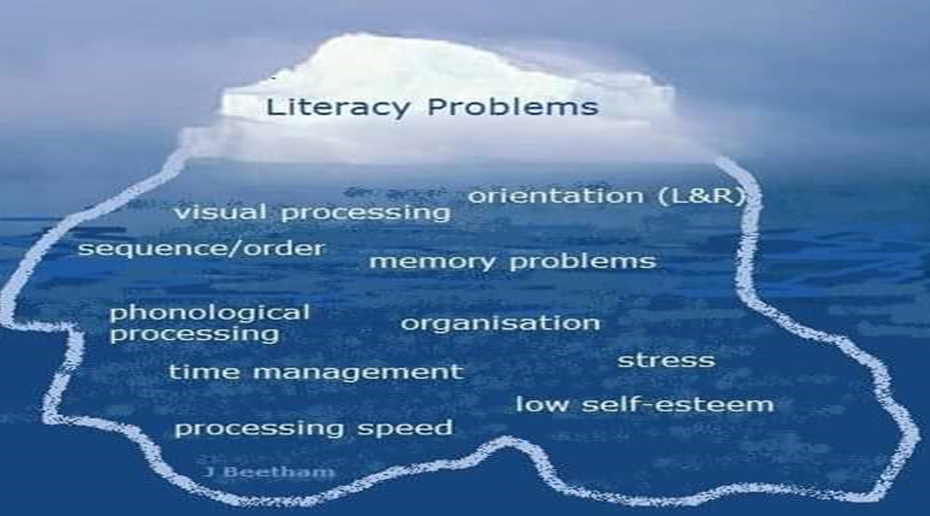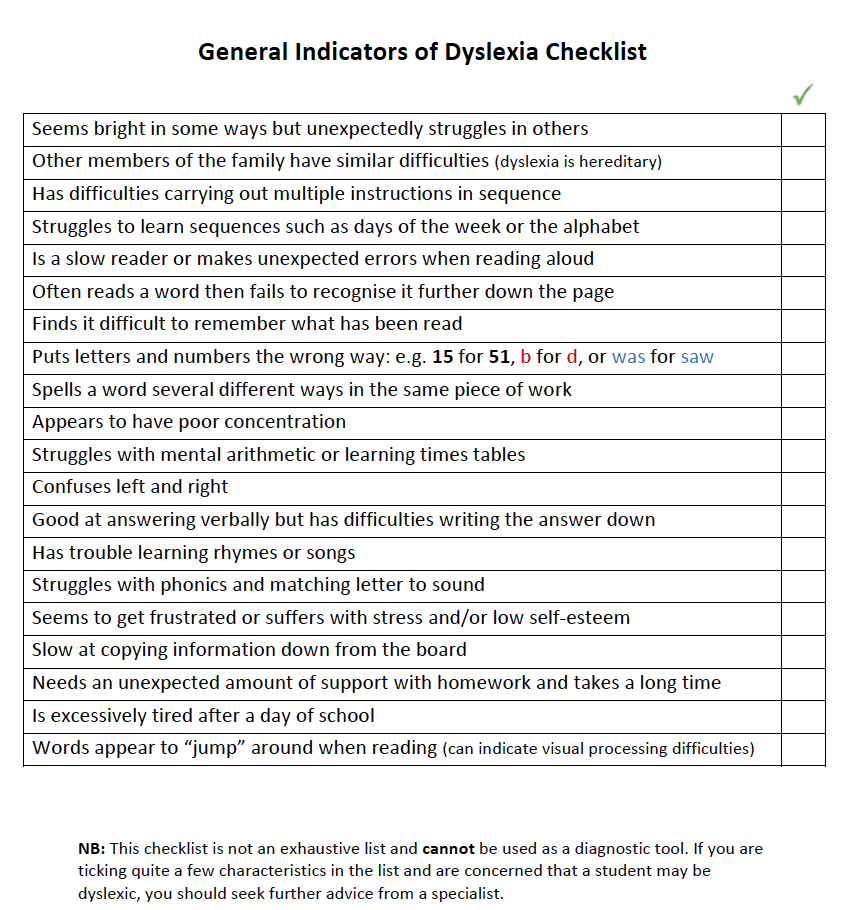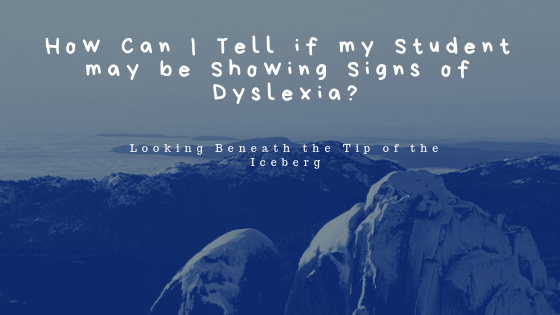It’s a question that concerns many teachers: could my student be dyslexic? Most teachers aren’t assessors and don’t want to jump to assumptions. Having a way to better understand what initial signs to look out for in order to know if we need to seek advice can be useful.
Dyslexia is a hidden learning difficulty that can affect different people in different ways depending on their profile, and its effects can range from mild to severe. Teachers sometimes notice something is not quite as it should be when they see a bright student unexpectedly struggling with tasks – it is this discrepancy between ability and attainment that usually highlights that something’s up. On the surface, the teacher may see issues with reading and/or spelling and writing, but underneath there may be a variety of issues going on that affect not only literacy, but daily life and routines.
 The metaphor of an iceberg is quite apt here: on the surface you see just the ice ‘mountain’, which represents the literacy difficulties. Below, there is so much more of the iceberg that isn’t visible. These ‘hidden’ areas of difficulty may include short term memory issues, which can cause problems with a myriad of tasks from remembering a morning routine, following instructions, sequencing thoughts for writing an essay to remembering what has just been read.
The metaphor of an iceberg is quite apt here: on the surface you see just the ice ‘mountain’, which represents the literacy difficulties. Below, there is so much more of the iceberg that isn’t visible. These ‘hidden’ areas of difficulty may include short term memory issues, which can cause problems with a myriad of tasks from remembering a morning routine, following instructions, sequencing thoughts for writing an essay to remembering what has just been read.
There may be phonological (sound) processing issues, which can cause difficulty breaking down sounds in words and therefore stumbling on/misreading words. Organization can sometimes be affected as can confidence.
So, what can the tutor look out for in order to better understand if a student would benefit from an assessment and/or getting some specialist advice?
The table below is a checklist of some of the key types of difficulties a child with dyslexia may have. The checklist can be used as a guide to spotting indicators of dyslexia. Remember, it is not an exhaustive list and cannot be used as a diagnostic tool. If you are ticking quite a few characteristics in the list and are concerned that a student may be dyslexic, you should seek further advice from a specialist.

Download and Print Checklist HERE
 Hannah MacLellan worked as a Dyslexia & Literacy Specialist at Dyslexia Action for many years and now works with the Units of Sound development team. She has considerable experience working with and providing advice, training and support to schools, colleges, community centers and parents.
Units of Sound has a home version, Literacy that fits, which is designed to get parents/guardians supporting their child at home without all the training that is involved with most intervention tools used in schools.
Hannah MacLellan worked as a Dyslexia & Literacy Specialist at Dyslexia Action for many years and now works with the Units of Sound development team. She has considerable experience working with and providing advice, training and support to schools, colleges, community centers and parents.
Units of Sound has a home version, Literacy that fits, which is designed to get parents/guardians supporting their child at home without all the training that is involved with most intervention tools used in schools.
Dyslexia is a hidden learning difficulty that can affect different people in different ways depending on their profile, and its effects can range from mild to severe. Teachers sometimes notice something is not quite as it should be when they see a bright student unexpectedly struggling with tasks – it is this discrepancy between ability and attainment that usually highlights that something’s up. On the surface, the teacher may see issues with reading and/or spelling and writing, but underneath there may be a variety of issues going on that affect not only literacy, but daily life and routines.

There may be phonological (sound) processing issues, which can cause difficulty breaking down sounds in words and therefore stumbling on/misreading words. Organization can sometimes be affected as can confidence.
So, what can the tutor look out for in order to better understand if a student would benefit from an assessment and/or getting some specialist advice?
The table below is a checklist of some of the key types of difficulties a child with dyslexia may have. The checklist can be used as a guide to spotting indicators of dyslexia. Remember, it is not an exhaustive list and cannot be used as a diagnostic tool. If you are ticking quite a few characteristics in the list and are concerned that a student may be dyslexic, you should seek further advice from a specialist.

Download and Print Checklist HERE
 Hannah MacLellan worked as a Dyslexia & Literacy Specialist at Dyslexia Action for many years and now works with the Units of Sound development team. She has considerable experience working with and providing advice, training and support to schools, colleges, community centers and parents.
Units of Sound has a home version, Literacy that fits, which is designed to get parents/guardians supporting their child at home without all the training that is involved with most intervention tools used in schools.
Hannah MacLellan worked as a Dyslexia & Literacy Specialist at Dyslexia Action for many years and now works with the Units of Sound development team. She has considerable experience working with and providing advice, training and support to schools, colleges, community centers and parents.
Units of Sound has a home version, Literacy that fits, which is designed to get parents/guardians supporting their child at home without all the training that is involved with most intervention tools used in schools.






